Britain's next prime minister will govern a nation of 66 million people, but only 0.25% of them had a say in the choice.
Either Boris Johnson or Jeremy Hunt will be announced Tuesday as the winner of a contest to lead the governing Conservative Party. After a formal handover of power, the victor will become prime minister the next day.
A look at how the process works:
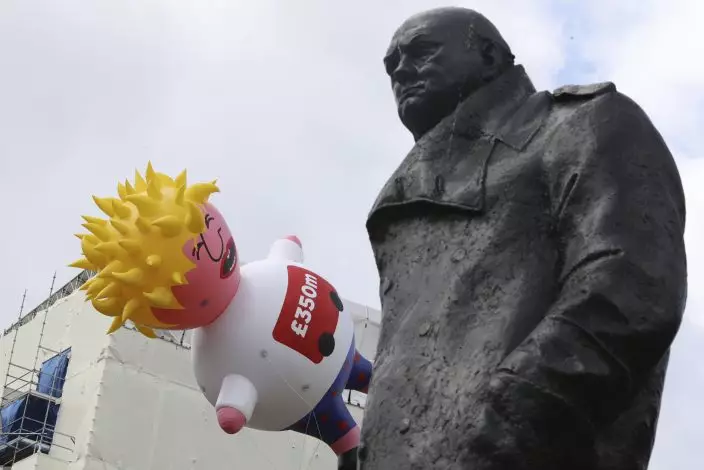
A blimp balloon depicting contender for leadership of Britain's ruling Conservative Party, Boris Johnson is launched outside Parliament, next to a statue of wartime leader Winston Churchill, during an anti-Brexit protest in London, Saturday July, 20, 2019. The pro-European march was organised by the March for Change group. Johnson is a leading Brexit advocate. (Aaron ChownPA via AP)
WHO VOTES?
In Britain's parliamentary system, voters elect a lawmaker for their local area. There are 650 of these constituencies across the U.K., and so 650 members of Parliament. The party with the most lawmakers forms a government, with the leader of that party becoming prime minister.
Parties are entitled to change leaders without going back to the voting public. It happened when Gordon Brown replaced Tony Blair as Labour prime minister in 2007, and when Theresa May took over from her Conservative predecessor David Cameron in 2016.
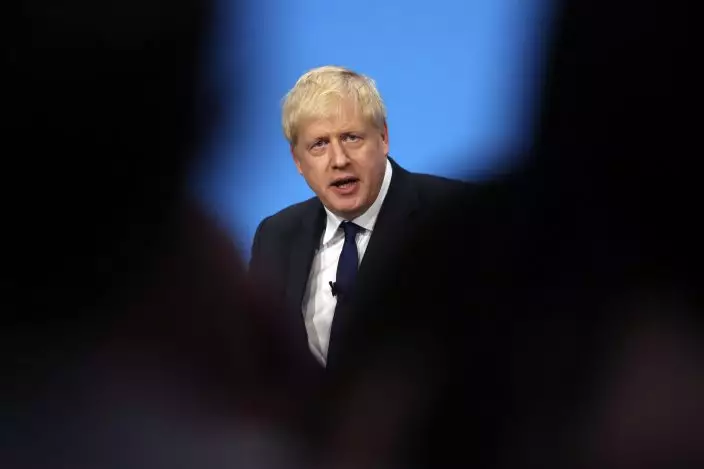
Conservative party leadership candidate Boris Johnson answers questions during a Conservative leadership hustings at ExCel Centre in London, Wednesday, July 17, 2019. The two contenders, Jeremy Hunt and Boris Johnson are competing for votes from party members, with the winner replacing Prime Minister Theresa May as party leader and Prime Minister of Britain's ruling Conservative Party. (AP PhotoFrank Augstein)
May announced her resignation last month, triggering a leadership contest in which any of the 313 Conservative legislators was eligible to run. The initial field of 10 candidates was then winnowed down to two in elimination votes by Tory lawmakers.
The final two, Hunt and Johnson, went to a runoff decided in a postal ballot of about 160,000 Conservative members across the country. To be eligible to vote, they need to have paid a 25 pound ($31) membership fee and been in the party for at least three months.
WHO ARE THEY?
The country's leadership choice is largely in the hands of comfortably off, older white men.
According to a U.K. academic study, 70% of Conservative members are men, half are over 55, 86% are middle class or above and 97% are white — in a country where 10%-15% of the population belongs to an ethnic minority.
Most of them want Britain to leave the European Union, whatever the consequences. Two-thirds of Conservatives support leaving the EU without a divorce deal even if it damages the British economy.
Both Johnson and Hunt campaigned on a promise to take Britain out of the 28-nation bloc, deal or no deal.
HOW DOES THE HANDOVER HAPPEN?
The winner of the vote will immediately become Conservative leader, but they won't be prime minister until a carefully choreographed political handover on Wednesday.
May is due to hold her final weekly prime minister's questions session in the House of Commons at noon Wednesday. Then she will travel to Buckingham Palace and ask Queen Elizabeth II to invite her Conservative successor to form a government.
The next leader will go to the palace before speaking to the nation in front of his new home at 10 Downing St.
WHEN DOES THE PUBLIC GET A SAY?
Most Britons have had to watch the leadership contest — complete with campaign rallies and televised debates — as passive spectators.
The situation strikes many as undemocratic, although the criticism is often partisan. In 2007, Johnson criticized Labour's handover from Blair to Brown without an election as "a palace coup" and compared it to the succession of Roman emperors.
He's not so critical of the current contest.
And, in comparison to presidential systems of government, it's relatively easy to get rid of a British prime minister.
Conservative lawmakers can trigger a no-confidence vote in their leader if 15% of them ask for it. May narrowly survived one such vote in December.
Alternately, the Labour opposition can call a no-confidence vote in the government — something that looks highly likely to happen by September. If the Conservative government lost such a vote, it would have 14 days to overturn the result with a new vote or fall, triggering a national election.
Britain's next scheduled election is in 2022, but the incoming prime minister might call an early vote if he can't get his plans approved, and seek a new mandate from the electorate. Even an unelected prime minister eventually has to face the judgment of the public.
Follow AP's full coverage of Brexit and the Conservative Party leadership race at: https://www.apnews.com/Brexit
PARIS (AP) — French President Emmanuel Macron warned Thursday that Europe could “die” if it fails to build its own robust defense as Russia’s war in Ukraine rages on, or if it fails to undertake major trade and economic reforms to compete with China and the U.S.
Macron urged Europeans to become more ambitious in a fast-changing world to face the challenges of war, fierce trade competition, energy scarcity, climate change and increasing authoritarianism.
In a nearly two-hour speech at Sorbonne University in Paris, Macron said that the continent is divided and “too slow and lacks ambition” at a time when the 27-member European Union needs to become a superpower, defend its own borders and speak with one voice if it wants to survive and thrive.
“Our Europe today is mortal,” Macron said. “It can die and that depends solely on our choices,” he added. He called on people to make those choices now because, “it’s today that Europe is between war and peace.”
Russia's full-scale invasion of Ukraine, now in its third year, is an existential threat and Europe isn't armed enough to defend itself when “confronted by a power like Russia that has no inhibitions, no limits,” Macron said.
‘Our ability to ensure our security is at stake," Macron said. “Russia mustn’t be allowed to win.”
Europe now has the “good fortune” of having the Biden administration’s commitment to supporting Ukraine, Macron said. But, in a year of key elections around Europe, in the U.S. and elsewhere, support may fragment or disappear entirely, he added.
“Europe must become capable of defending its interests, with its allies by our side whenever they are willing, and alone if necessary,” Macron said.
Strong armies, a European rapid intervention program and force, tanks, a missile shield and other weapons, produced in Europe, will need the support of “a joint diplomatic force that will speak with one voice and build bridges with Africa and Latin America,” the French leader said.
“Only then will Europe show that it's not a United States’ lap dog, and that it also knows how to talk to other regions of the world,” he said.
France has been a firm supporter of Ukraine in its fight against Russian aggression, and Macron has often clashed with other Western leaders as he has insisted that Europe must stand by the country at any cost. The French president alarmed European leaders by saying recently that sending Western troops into Ukraine to shore up its defenses shouldn’t be ruled out.
Referring to trade practices of China and the U.S., Macron said “the two world powers have decided not to respect the rules of global trade” by shoring up protections and subsides while Europe’s industry remains open and is stuck in overregulation.
“Let’s do the same, we are in competition,” Macron said.
“We must buy faster, we must produce more and we must buy more that is made in Europe. That is key,” Macron said.
Thursday's speech came less than two months before a pivotal European Parliament election.
Macron, an avid advocate of a united and assertive Europe, also rallied support for his centrist Renaissance party before the June 6-9 vote as far-right parties lead the moderate coalitions in the polls. He called for safeguarding democratic values as the “authoritarian model” was becoming “more popular” across the continent.
The war in Ukraine and immigration are top priorities for European Union voters, according to polls. Far-right parties have gained support by criticizing Macron’s government policies on both issues. Macron acknowledged divisions on immigration policies, including on asylum and deportation rules for those who have arrived to Europe illegally.
He emphasized the need for an effective response and Europe-wide coordination for curbing illegal immigration, closer cooperation with immigrants' countries of origin and a unified, relentless fight against human traffickers.
Macron criticized the idea of striking an agreement, as Britain as done, with countries in Africa and elsewhere to transfer immigrants there.
“This is a betrayal of our values that ultimately leads us to dependency on other counties,” Macron said.
The British government earlier this week approved a law allowing the deportation of some migrants who enter the country illegally to Rwanda.
Macron lost his majority in France’s most influential house of parliament, the National Assembly, after the 2022 election to the far-left coalition and the far-right National Rally party.
The social situation in France remains tense as Paris prepares to host the Olympic Games this summer, amid protests from teachers and police officers, and farmer demonstrations in recent weeks. The protests follow huge rallies last year against Macron’s ultimately successful proposal to increase the retirement age from 62 to 64.
Barbara Surk reported from Nice, France. Lorne Cook contributed to this report from Brussels.
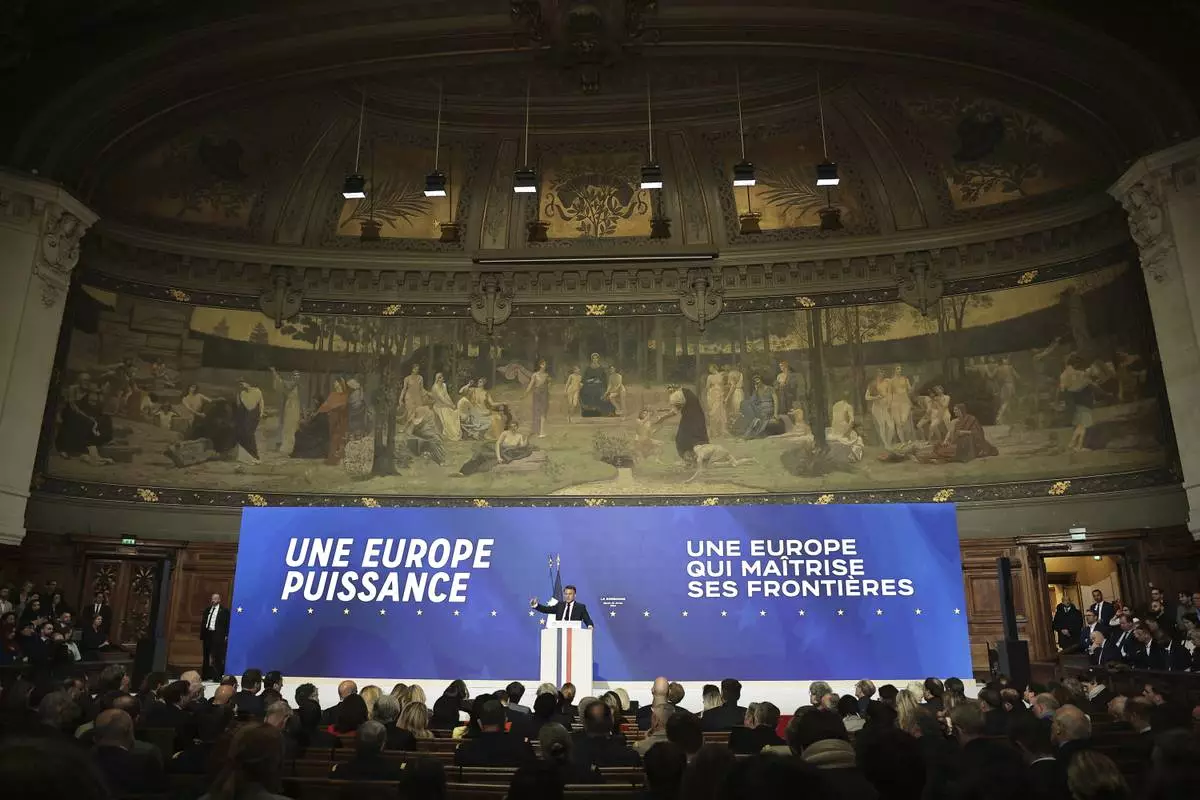
French President Emmanuel Macron delivers a speech on Europe in the amphitheater of the Sorbonne University, Thursday, April 25 in Paris. 2024. French President Emmanuel Macron will outline his vision for Europe as a more assertive global power at the backdrop of war in Ukraine, security, and economic challenges in a speech ahead of pivotal election for the European Parliament in June. (Christophe Petit Tesson, Pool via AP)
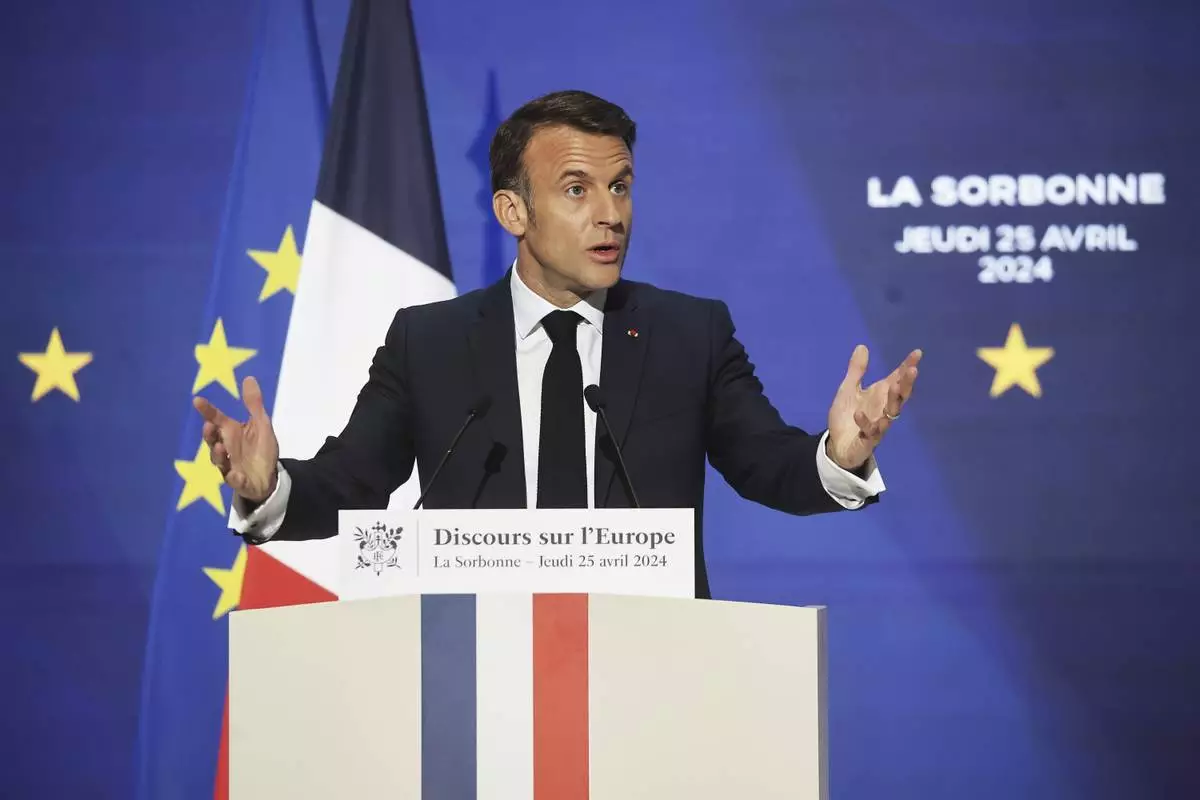
French President Emmanuel Macron delivers a speech on Europe in the amphitheater of the Sorbonne University, Thursday, April 25 in Paris. 2024. French President Emmanuel Macron will outline his vision for Europe as a more assertive global power at the backdrop of war in Ukraine, security, and economic challenges in a speech ahead of pivotal election for the European Parliament in June. (Christophe Petit Tesson, Pool via AP)
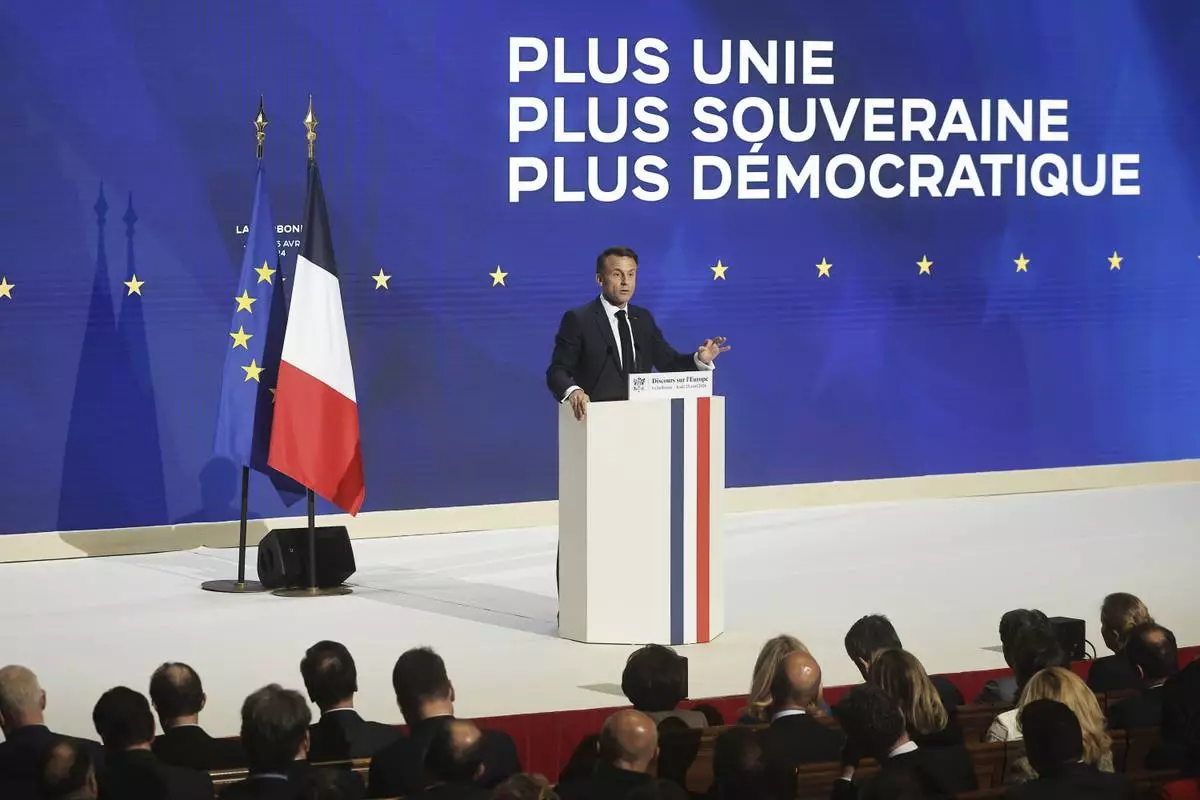
French President Emmanuel Macron delivers a speech on Europe in the amphitheater of the Sorbonne University, Thursday, April 25 in Paris. 2024. French President Emmanuel Macron will outline his vision for Europe as a more assertive global power at the backdrop of war in Ukraine, security, and economic challenges in a speech ahead of pivotal election for the European Parliament in June. (Christophe Petit Tesson, Pool via AP)
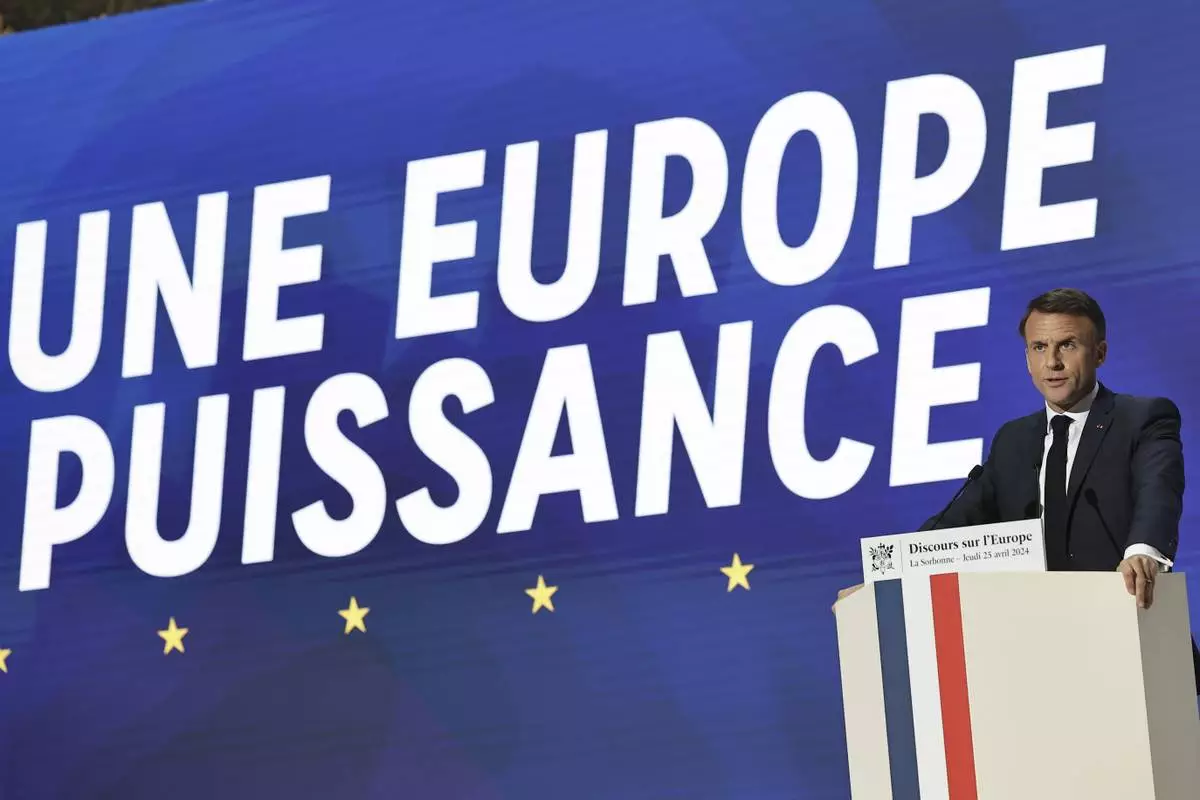
French President Emmanuel Macron delivers a speech on Europe in the amphitheater of the Sorbonne University, Thursday, April 25 in Paris. 2024. French President Emmanuel Macron will outline his vision for Europe as a more assertive global power at the backdrop of war in Ukraine, security, and economic challenges in a speech ahead of pivotal election for the European Parliament in June. (Christophe Petit Tesson, Pool via AP)
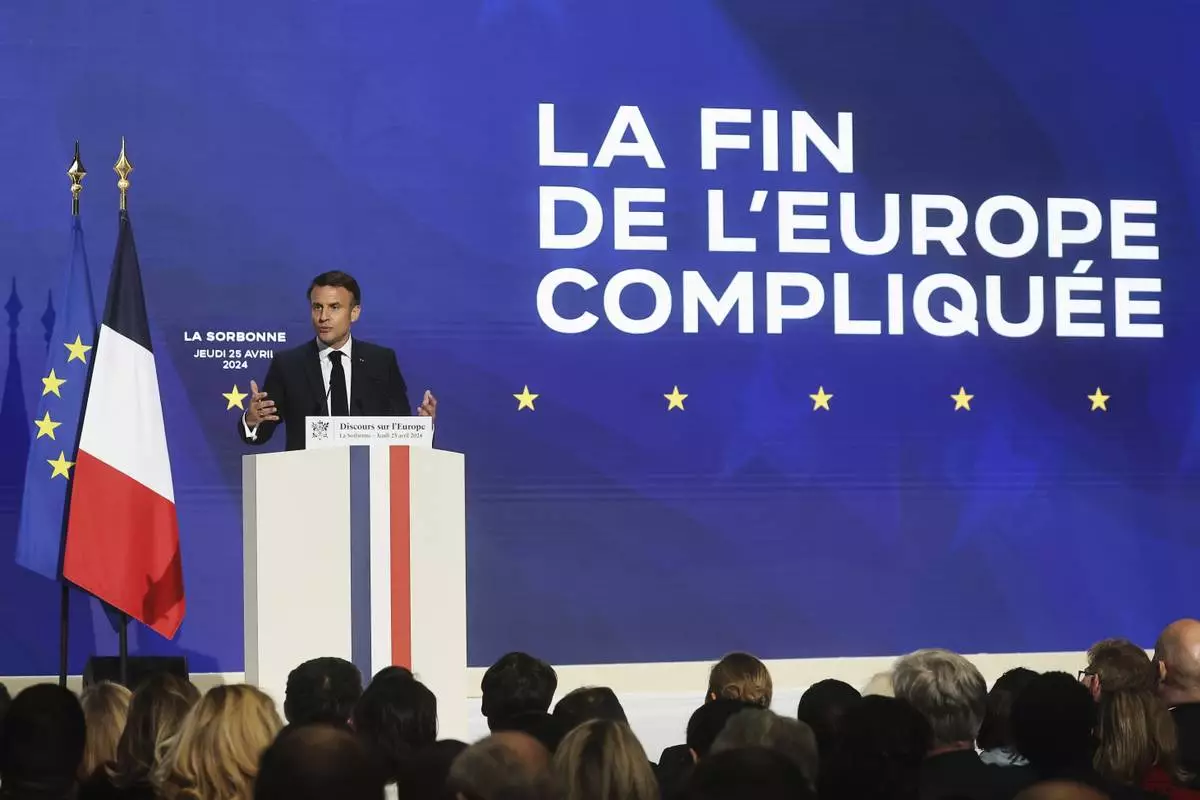
French President Emmanuel Macron delivers a speech on Europe in the amphitheater of the Sorbonne University, Thursday, April 25 in Paris. 2024. French President Emmanuel Macron will outline his vision for Europe as a more assertive global power at the backdrop of war in Ukraine, security, and economic challenges in a speech ahead of pivotal election for the European Parliament in June. (Christophe Petit Tesson, Pool via AP)
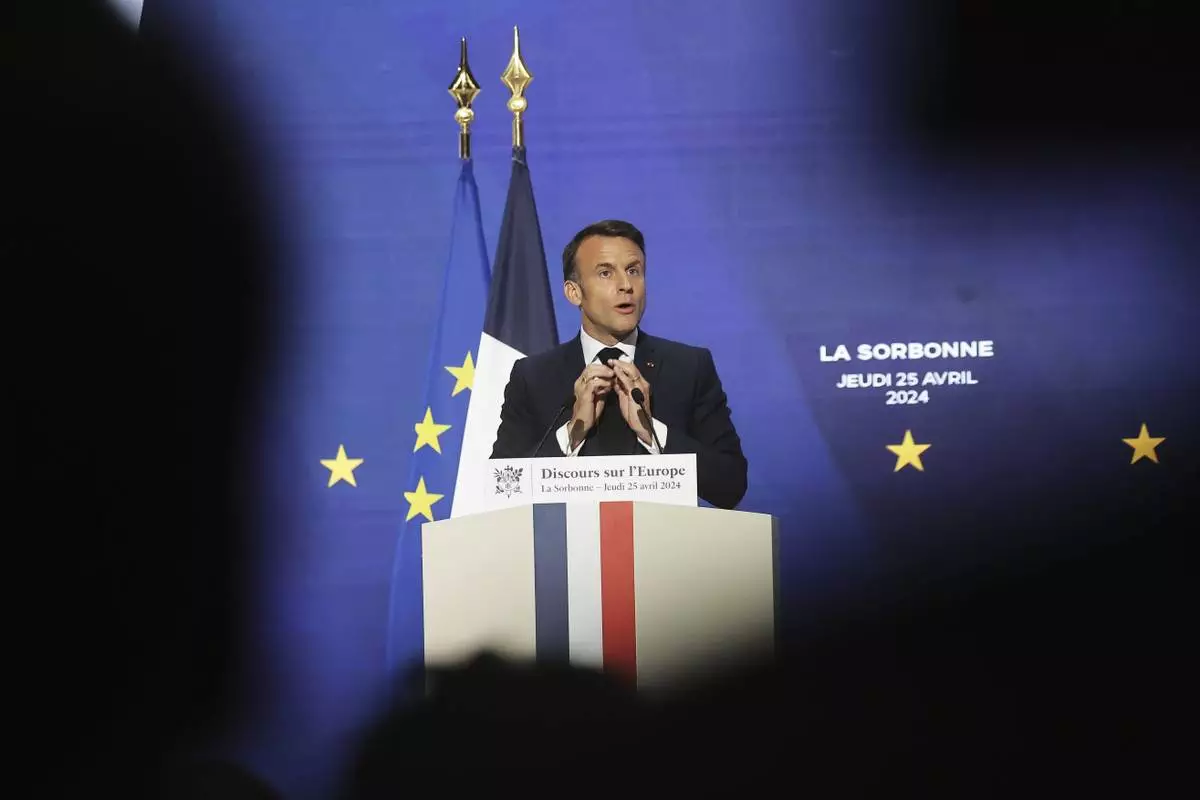
French President Emmanuel Macron delivers a speech on Europe in the amphitheater of the Sorbonne University, Thursday, April 25 in Paris. 2024. French President Emmanuel Macron will outline his vision for Europe as a more assertive global power at the backdrop of war in Ukraine, security, and economic challenges in a speech ahead of pivotal election for the European Parliament in June. (Christophe Petit Tesson, Pool via AP)
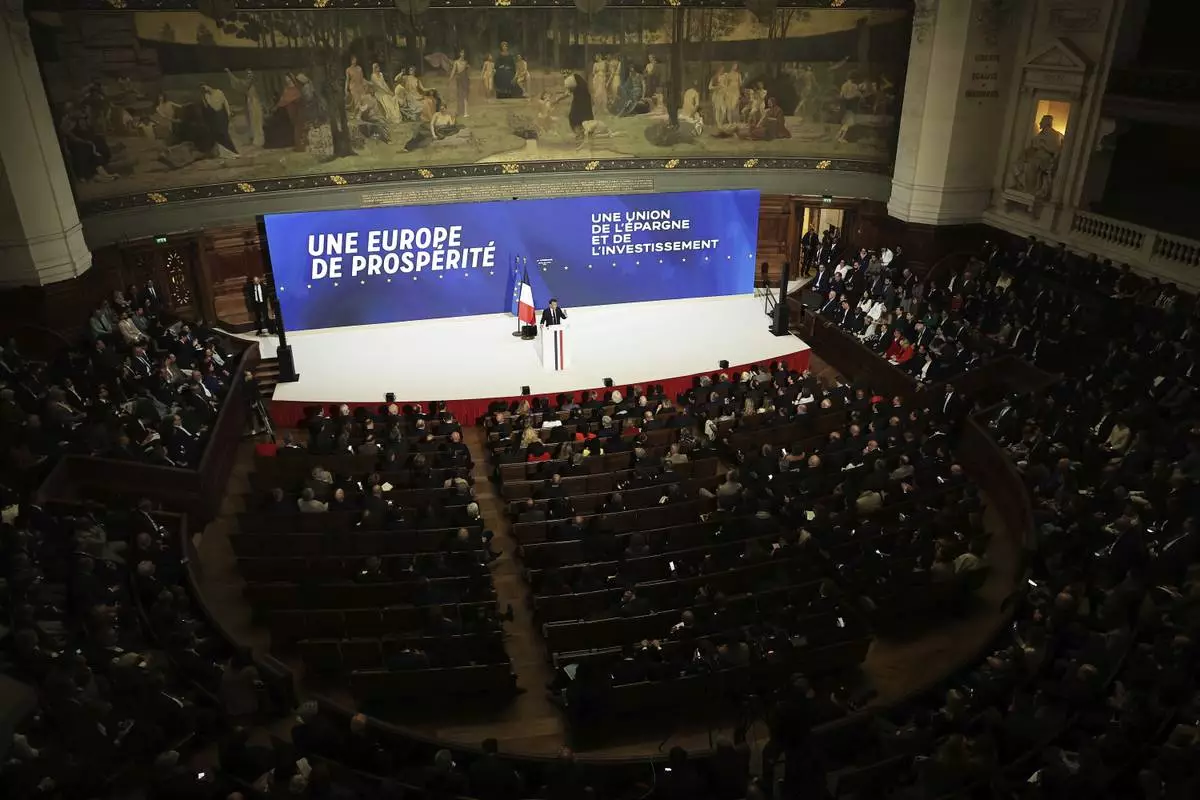
French President Emmanuel Macron delivers a speech on Europe in the amphitheater of the Sorbonne University, Thursday, April 25 in Paris. 2024. French President Emmanuel Macron will outline his vision for Europe as a more assertive global power at the backdrop of war in Ukraine, security, and economic challenges in a speech ahead of pivotal election for the European Parliament in June. (Christophe Petit Tesson, Pool via AP)
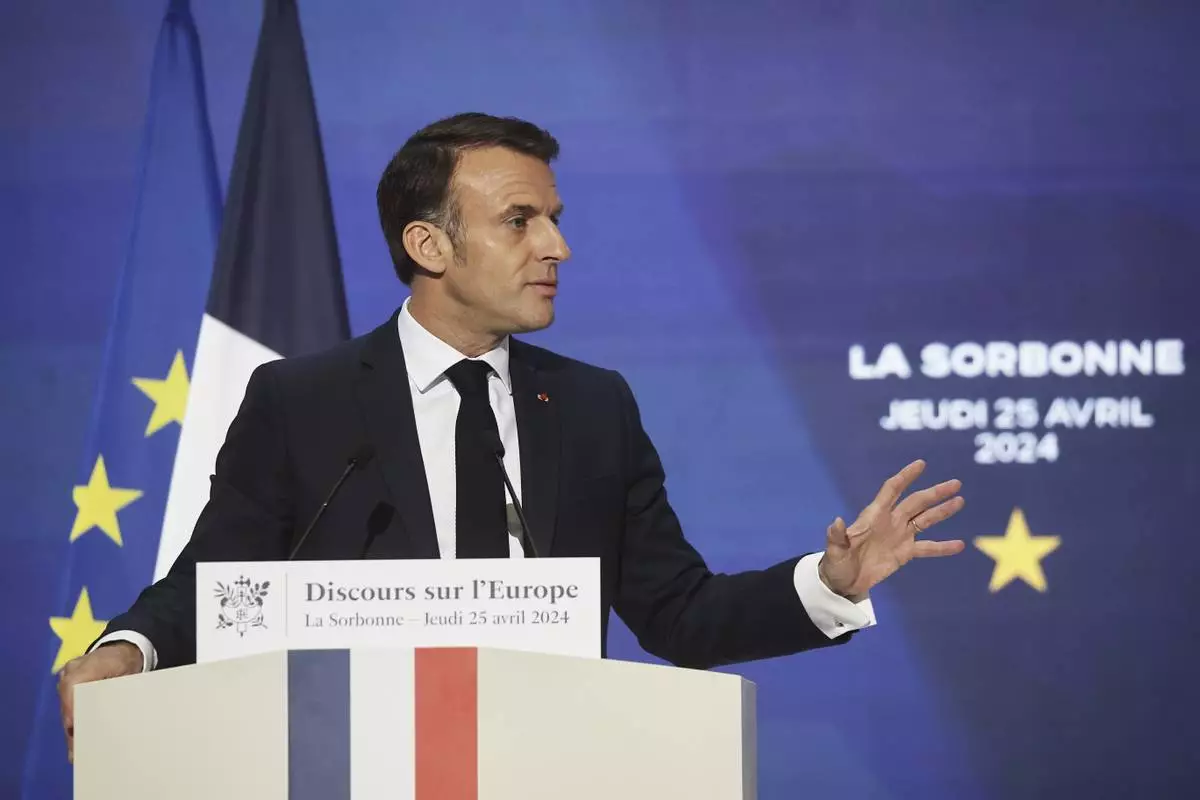
French President Emmanuel Macron delivers a speech on Europe in the amphitheater of the Sorbonne University, Thursday, April 25 in Paris. 2024. French President Emmanuel Macron will outline his vision for Europe as a more assertive global power at the backdrop of war in Ukraine, security, and economic challenges in a speech ahead of pivotal election for the European Parliament in June. (Christophe Petit Tesson, Pool via AP)
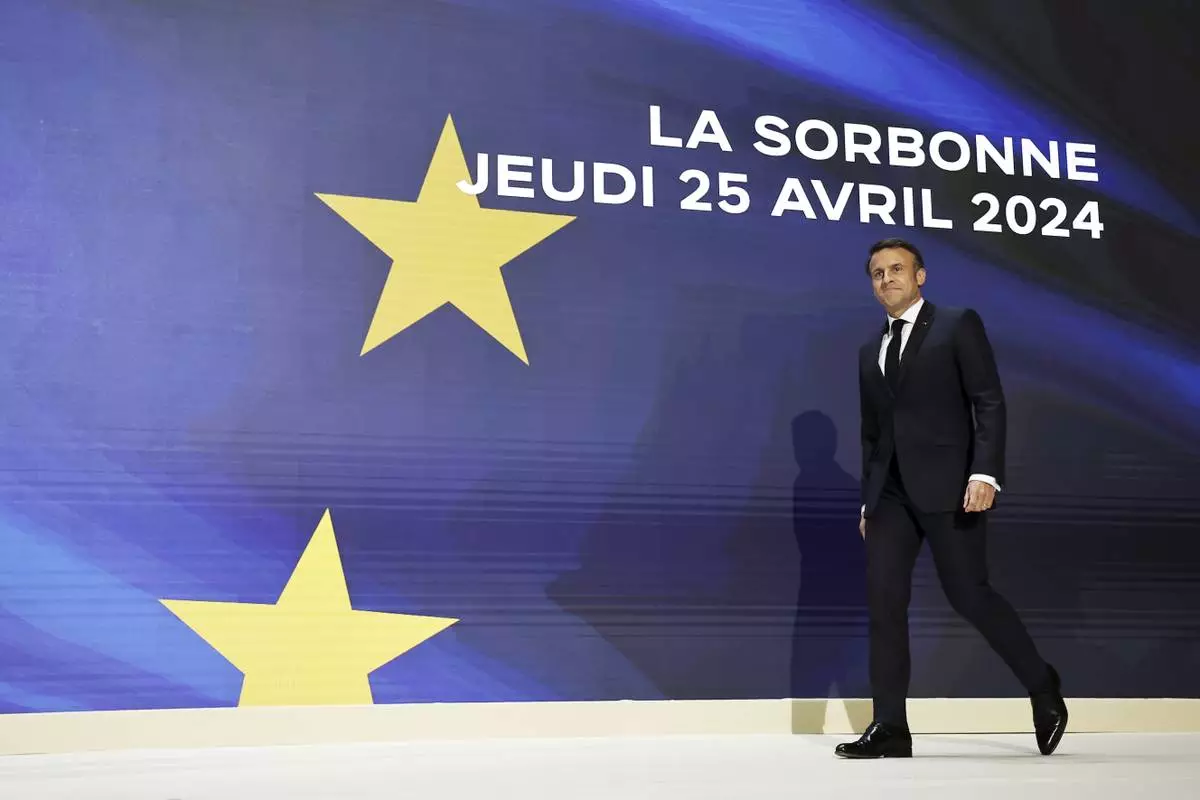
French President Emmanuel Macron arrives to deliver a speech on Europe in the amphitheater of the Sorbonne University, Thursday, April 25 in Paris. 2024. French President Emmanuel Macron will outline his vision for Europe as a more assertive global power at the backdrop of war in Ukraine, security, and economic challenges in a speech ahead of pivotal election for the European Parliament in June. (Christophe Petit Tesson, Pool via AP)
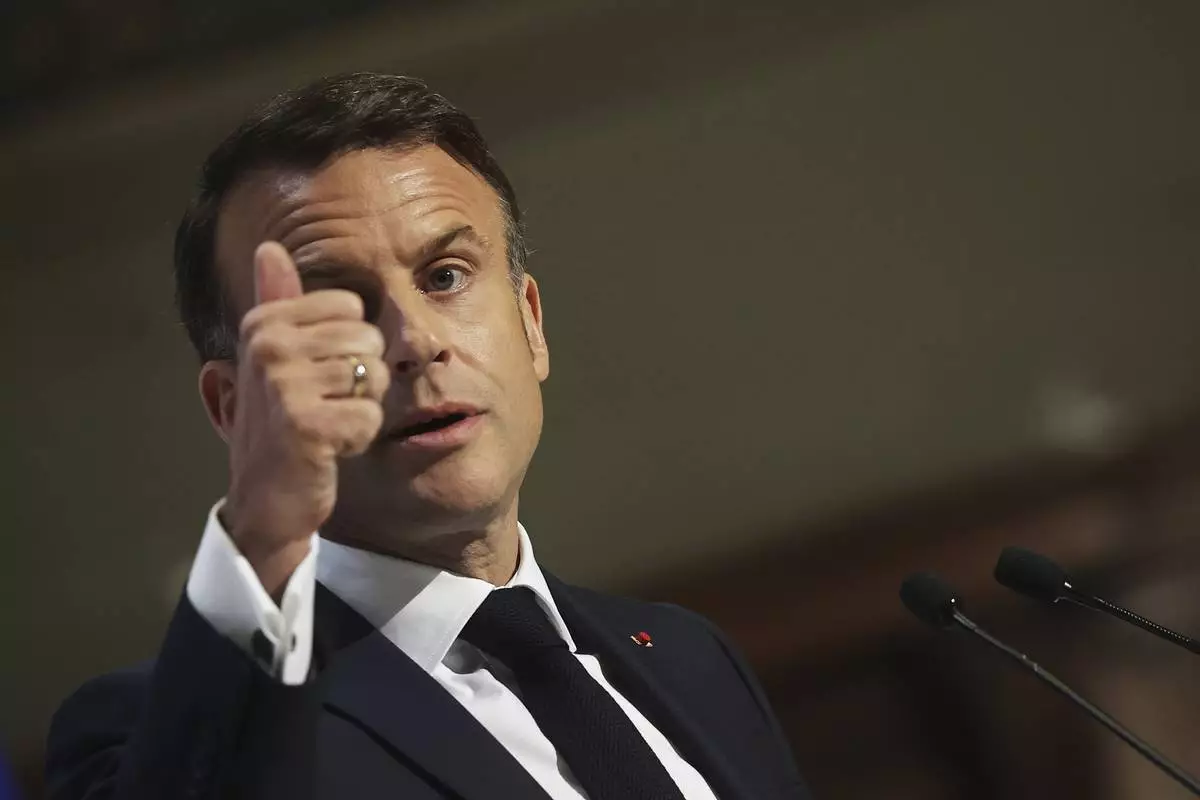
French President Emmanuel Macron delivers a speech on Europe in the amphitheater of the Sorbonne University, Thursday, April 25 in Paris. 2024. French President Emmanuel Macron will outline his vision for Europe as a more assertive global power at the backdrop of war in Ukraine, security, and economic challenges in a speech ahead of pivotal election for the European Parliament in June. (Christophe Petit Tesson, Pool via AP)
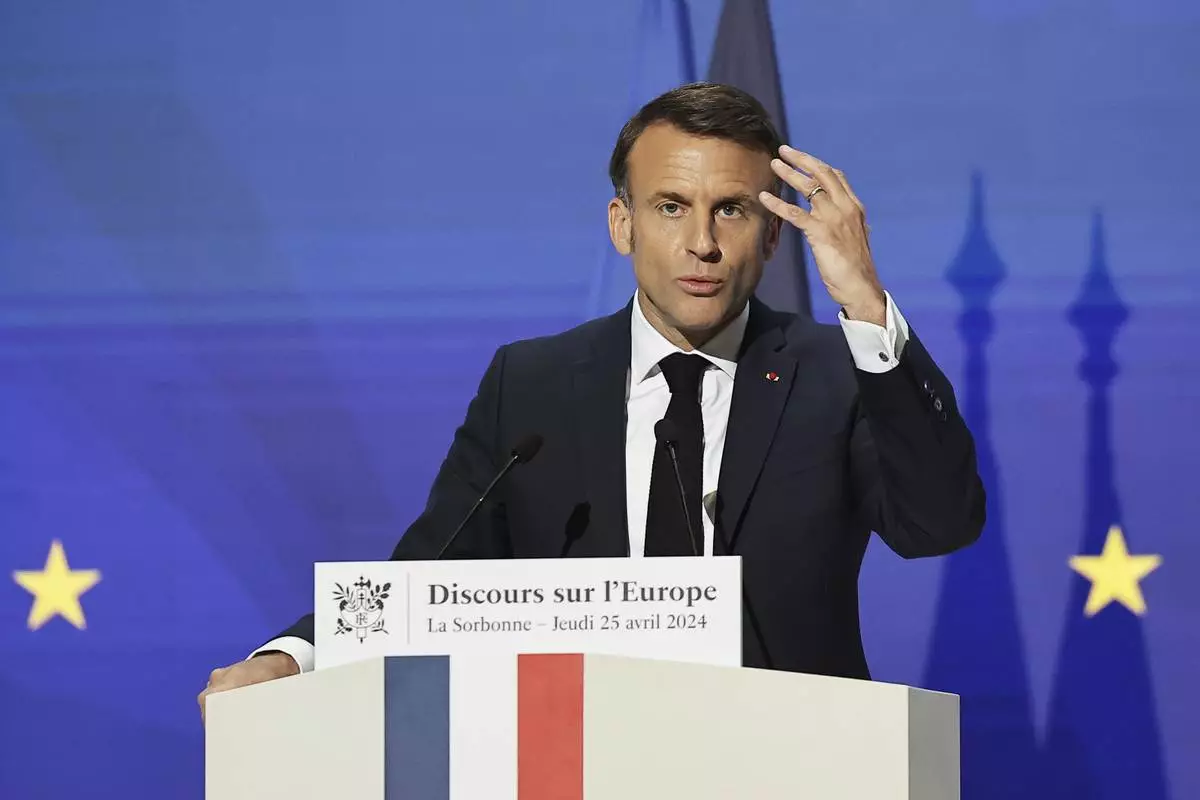
French President Emmanuel Macron delivers a speech on Europe in the amphitheater of the Sorbonne University, Thursday, April 25 in Paris. 2024. French President Emmanuel Macron will outline his vision for Europe as a more assertive global power at the backdrop of war in Ukraine, security, and economic challenges in a speech ahead of pivotal election for the European Parliament in June. (Christophe Petit Tesson, Pool via AP)
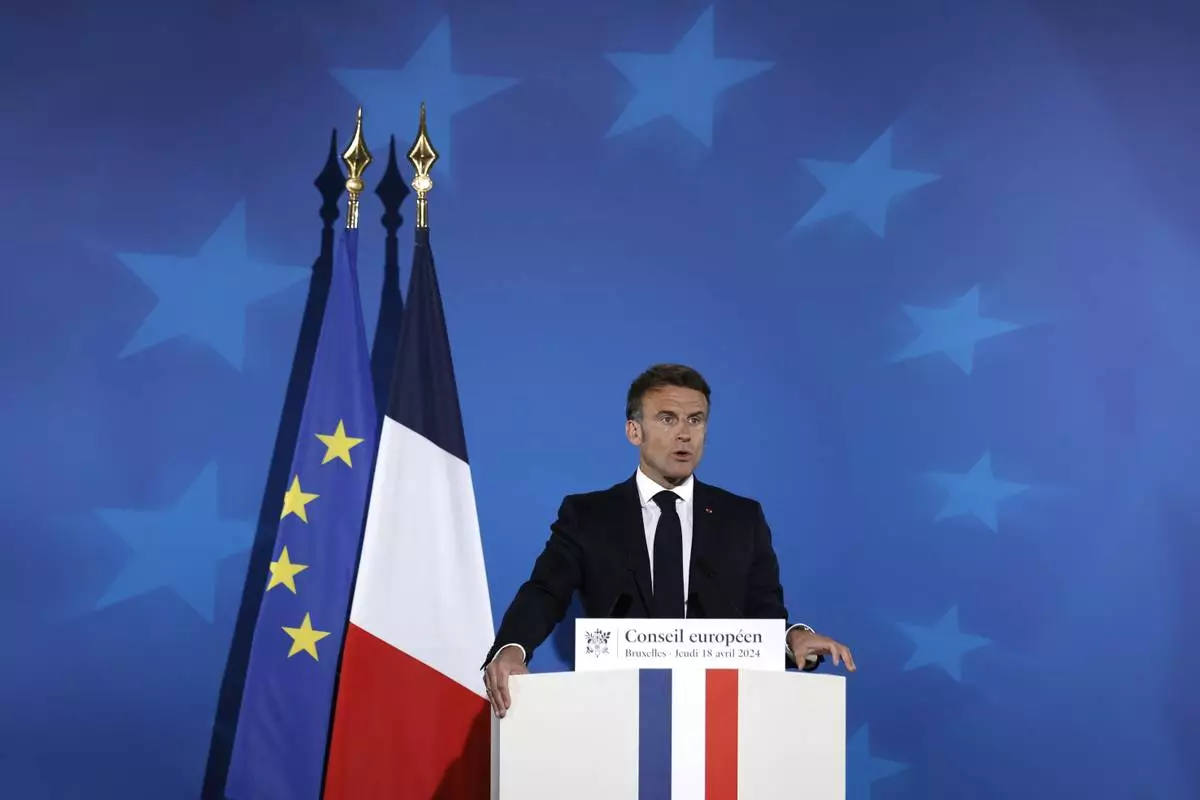
French President Emmanuel Macron speaks during a media conference at an EU summit in Brussels, Thursday, April 18, 2024. European Union leaders on Wednesday debated a new "European Competitiveness Deal" aimed at helping the 27-nation bloc close the gap with Chinese and American rivals amid fears the region's industries will otherwise be left behind for good. (AP Photo/Omar Havana)























